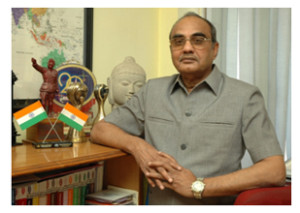
CMS VATAVARAN is made possible with the support from our partners, participants and also under the guidance of the CMS Chairman, Dr N Bhaskara Rao. It was in the year 2002 that Dr Rao envisioned a medium through which environment concerns could be addressed.
This week, we are featuring Dr Rao in a special interview that will illustrate his vision for CMS VATAVARAN. In this interview, Dr Rao shares his journey with CMS VATAVARAN and his plans for the future.
Q. What has been the impact of CMS VATAVARAN since its inception in 2002?
First, I would like reiterate CMS VATAVARAN is much more than a film festival. Films of course have good potential to contribute in sensitizing a nation. But using film festival as a nucleus for discussions between experts, policy people and activists towards involving and encouraging all of them for sustainable environment and behavioral changes is what CMS VATAVARAN is all about.
Measuring the true impact of climate change initiatives is a process, not a one-time affair. It can only be assessed over a much longer period. In the meanwhile, surrogate indicators help us know the direction that CMS VATAVARAN is heading. For example, against hardly one percent of space/time devoted for environment more than a decade ago, today it has increased to three percent. Environment was one of the top ten concerns of people of the country a decade ago, but today it is within the top five concerns. Against hardly fifty who were producing films on environment and wildlife a decade ago, today there are more than 500, many of them new ones promoted by CMS VATAVARAN awards. The attendance who visit and the scale of CMS VATAVARAN is many times more now. But we have a long way to go particularly in terms of behavioral change.
Q. What are your expectations from the film festival this year?
While schools have taken good deal of interest in CMS VATAVARAN, participation of civil society groups is only a recent phenomenon. The news media coverage is still not anywhere it should be. And coverage is not as a proactive concern. It is mostly sponsored or advertising driven. The CMS VATAVARAN Travelling Festival has achieved far more than the ones in Delhi. There are so many individuals taking initiatives and trying to do on their own to better environment. Yet, we are not able to bring them to fore and focus. Also, government participation is erratic as if the potential and relevance of visual media is yet to be realized.
Q. Do you think that the film festival has achieved the objectives it has laid out in the last 13 years?
Objectives to do with environment cannot be achieved overnight. It is a process. It has to be kept up and sustained without losing novelty, dimension and persuasive character. Some of the deliberations, for example, Mayors and Commissioners of cities held a couple of years ago did create new found enthusiasm and sensitized and led to new initiatives. Similarly more than a dozen award winning films on a wide range of concerns like whale fish, saving turtles, preserving Red Panda, highlighting perils of e-waste and mining, etc have contributed directly in policy formulation and correctives.
CMS VATAVARAN is a strategy to cater to the larger goal of sustainable development. It is not an end in itself. It was devised based on some years of field research on India’s development pursuit and pitfalls. It realizes that unless environment becomes a core of public agenda of the nation, it cannot be sustained. What started as an experiment in 2002, CMS VATAVARAN has now become a national movement. I am happy what we could accomplish so far with limited external support. But we are nowhere near, mostly because there are contradictory and conflicting policies and counter pressures.

